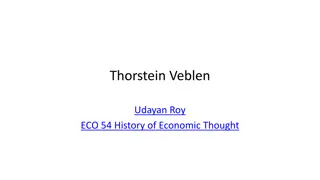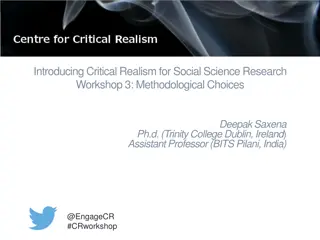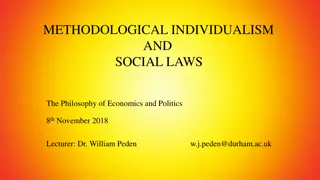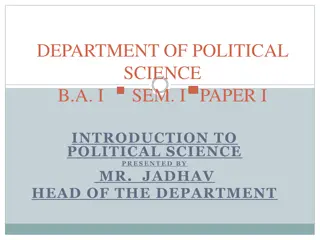Institutionalism and Methodological Issues in Political Science
Institutionalism is a foundational concept in political science, emphasizing the study of governing institutions and their role in shaping political behavior. It explores inductive and deductive approaches to research, highlighting the significance of empirical evidence and theoretical assumptions. Institutions are viewed as central to understanding political processes, encompassing governmental bodies, political parties, and other established practices. The discussion also touches upon the institutionalization of norms and practices in different political contexts.
Download Presentation

Please find below an Image/Link to download the presentation.
The content on the website is provided AS IS for your information and personal use only. It may not be sold, licensed, or shared on other websites without obtaining consent from the author. Download presentation by click this link. If you encounter any issues during the download, it is possible that the publisher has removed the file from their server.
E N D
Presentation Transcript
Institutionalism(s) Methodological issues in Political Science Antonios Vlassis
Inductive and deductive approach Behaviouralism and rational choice theory represent two different logics of research The inductive logic and the deductive one. Inductive approaches to political analysis take as their starting point the neutral and dispassionate assessment of empirical evidence They begin in short with specific observations from which they seek to generate (through inductive generalisation). Inductive approach corresponds to activities of scientists who make careful observations, conduct experiments, analyse the data obtained and produce new theories or discoveries. Theory in such a strategy logically follows observation and generalisation. Induction in the social sciences is associated with empiricism.
Inductive and deductive approach Deductive approaches to political analysis are essentially a mirror image of such a strategy. Rather than starting with observation, they seek to deduce testable propositions or hypotheses from initial theoretical assumptions (such as rational choice theories). The hypotheses formulated are exposed to rigorous scrutiny. The hypothesis are confirmed or rejected. A good example is that proposed by Anthony Downs An economic theory of democracy . Downs starts with a series of simplifying theoretical assumptions regarding rational behaviour of political parties, which establish the parameters of his model.
Institutionalism(s) The study of governing institutions is a central purpose of political science in general. The mantra often seen in studies of politics that institutions matter. Institutionalism provides the original foundation of the discipline and lies at the core of the discipline. What then is an institution? In politics the term refers to the major organizations of national government, particularly those specified in the constitution such as the legislature, the judiciary, the executive and sometimes political parties. However the concept of an institution is also used broadly to include other organizations, which may have a less secure constitutional basis, such as the bureaucracy and local government.
Institutionalism(s) It is also used widely to denote virtually any organization (such as interest groups) or even any established and well-recognized political practice. For instance, scholars refer to the institutionalisation of corruption in Malaysia or in Nigeria: the abuse of public office for private gain in these countries has become an accepted routine of political life an institution in its own right. An accepted pattern of political behaviour. Trust is an institutionalised norm practice in Scandinavian countries. Political institutions are the rules of the game. The question is however, what should be included in the concept of rules. One such classic division is between formal and informal rules.
Institutionalism(s) Most people most of the time follow predefined rules of behaviour and most of these rules are not formalised as laws or other written regulations. Instead they are routines, customs, compliance procedures, habits, decision styles, or even social norms and culture. On the other hand, political institutions in a narrower sense can be defined as formal arrangements for aggregating individuals and regulating their behaviour through the use of explicit rules and decision processes enforced by an actor or set of actors formally recognised as possessing such power.
Old institutionalism Until the 1950s, the dominance of the institutional approach (old institutionalism) within political science was such that its assumptions and practices were rarely specified or criticised. Outside of political theory, the core activity within political science was the description of constitutions, legal systems and government structures and their comparison over time and across countries. (Old) Institutionalism was political science (until 1950s). The behavioural revolution was devoted to dismiss the formalism of politics. Rational choice theorists aimed to explain politics in terms of the interplay of individual s self interests.
Old institutionalism Institutional analysis assumes that positions within organizations matter more than the people who occupy them. The focus of old institutionalism was upon formal rules and organisations, on official structures of government rather than broader institutional constraints on governance (outside as well as inside the state). The old institutionalism describes and analyses the political world in non-abstract world. The proto-theory of old institutionalism was: Normative (concerned with good government) Structuralist (structures determine political behaviour) Historic (describing the historical developments of organizations) Legalist (law plays a major role in governing) And holistic (concerned with describing and comparing whole systems of government)
Old institutionalism Institutions were defined in a narrow sense overlapping with state powers (legislative, executive, judiciary), civil administration, and military bureaucracy. The type of analysis was formal, using as main data constitutional texts and legal documents. The emphasis on the study of formal political institutions focused on the geographical areas where they first developed, namely Western Europe and North America. And comparative politics before the SWW was mainly concerned with the analysis of the State and its institutions (executive and legislative). From its founding until the 1950s, political science mostly focused on constitutional law, institutional organizations, political history and biographies of statesmen. We understand political science as a science of State.
New institutionalism(s) In fact by the end of the 1980s, a new institutionalism has emerged as a reaction to the under-socialised and under-historical character of dominant approaches in the discipline. Both behaviourism and rational choice theory has dismissed institutional as no more than the simple aggregation of individual preferences. While institutionalism may never really have gone away, it was perceived by the 1980s as being outside the political science mainstream. The result of rational choice is a unhistorical approach to politics, which denies history as process or otherwise the historical significance of practice. The new institutionalism operates with a more expansive definition of institutions and with more explicit theoretical frameworks. Political institutions are no longer a synonym with political organization. The new institutionalists assert that the organisation of political life makes a difference. Institution is a general pattern or categorization of activity, it refers to a particular human constructed arrangement, formally or informally organized (marriage, religion, diplomacy in IR).
New institutionalism(s) Political institutions are no longer equated with political organization; Institutions are understood more broadly to refer to a stable, recurring pattern of behaviour. Institutions are also norms of behaviour that structure repeated human interaction. The new institutionalists are concerned with the informal conventions of political life as well as with formal constitutions and organisational structures. Crucially, new institutionalists concern themselves not just with the impact of institutions upon individuals but with the interaction between institutions and individuals
New institutionalism(s) March and Olsen who invented the term new institutionalism, they criticized mainstream political science as reductionist. March and Olsen s proposition tries to explore fascinating questions about what constitutes a political institution about the way institutions do their work , about the capacity of individual actors to influence the shape and functioning of autonomous political institutions, etc. Political institutions influence behaviour by affecting the structure of a situation in which individuals select strategies for the pursuit of their preferences. The different kinds of new institutionalism (rational choice, sociological or historical) would agree that institutions influence actors strategies, that is, the way they try to reach their goals This is obvious from the fact that institutions determine : Who are the legitimate actors; The number of actors; What information actors will have about each other s intentions. The problem is what institutions do with preferences At the end, there are two very different views (rational choice institutionalism # sociological and historical ones).
New institutionalism(s) Calculus approach (rational choice institutionalism) This logic is the view, common in the economic approaches, which holds that preferences can only be held by individuals and they are exogenous to institutions Rational choice research on institutions focuses on specific institutions, such as International Organizations (IOs) and it is based on exchange theory. It assumes competition and rationality on the part of the actors. But there are potential gains from institutions. The institutions such as IOs provide information, stabilize expectations, reduce cost transactions. Rational choice institutionalism denies that institutional factors produce behaviour or shape individuals preferences. Political institutions influence behaviour by affecting the structure of a situation in which individuals select strategies for the pursuit of their preferences. Role of institutions: they provide information relevant to the behavior of others, enforcement mechanisms for agreements, penalties for defection. Institutions provide information (through monitoring) and stabilize expectations. Institutions reduce certain forms of uncertainty, they create an environment of predictability, they reduce transaction costs Actors use institutions in order to maximise their utility. However, they face rule-based constraints provided by the institutional environment which influence their strategies. The actors come to the institutionalised game with a fixed set of preferences. Institutions determine the exchanges that take place among actors but the institutions as such do not influence preferences. An institution depends on the benefits it can deliver. The process of creating institutions and of maintaining institutions is a highly purposive one, largely under the control of actors who correctly perceive the effects of the institutions. If institutions change, actors usually change their strategy, but not their preferences.
New institutionalism(s) Cultural approach At the other end, is the more historical or sociological approach which holds that institutions dictate a logic of appropriatness, that is, institutions tell actors what they should prefer in that specific situation in which they are placed. Without denying that individual action is purposive, this approach assumes that individuals cannot be considered to have the ability necessary to be fully rational in their interaction with other agents. Instead they tend to follow scripts or templates given to them by the institutions in which they are acting. Historical institutionalists have been strong proponents of an image of political interaction that is path dependent, they reject the traditional assumption that the same forces will generate the same results everywhere in favour of the view that the effect of such forces will be mediated by the contextual features of a given situation often coming from the past. These features are institutional in nature, they are persistent. Historical institutionalists have devoted a good deal of attention to the problem of explaining, how institutions produce such paths, how they structure a nation s response to new challenges. The central claim of historical institutionalism is that choices formed when an institution is being formed, or when a policy is being formulated, have a constraining effect into the future The sociological institutionalists tend to define institutions much more broadly, they are templates that provide the frames of meaning guiding political action In a given institutional setting, the agent usually does not calculate what action would enhance his or her utility the most. Instead by reference to the institutional setting, he/she asks Who am I? , and what is the appropriate action for such an individual in this situation. In this understanding of institutions, institutions not only determine actors preferences but also to some extent create them. Institutions create or socially construct the actors identities, definitions of reality and shared meanings. We focus on the normative dimension of institutional impact. Institutions do not simply affect the strategic calculations of individuals, as rational choice institutionalists contend, but also their preferences and their identities. They provide the scripts, categories and models that are indispensable for action. From this perspective, rational choice institutionalism seem only to deal with one dimension of a multidimensional reality. They are incomplete since they ignore changes taken place in consciousness. The assumption of fixed preferences seem to preclude understanding of major changes in human institutions (end of slavery).
New institutionalism(s) Despite the differences, the points of departure represented by the three kinds new institutionalism are therefore best represented in terms of movement along analytical continua: From a focus on organisations to a focus on rules and norms From a formal to an informal conception of institutions From a static to a dynamic conception of institutions From a holistic to a disaggregated conception of institutions From independence to embeddedness.
New institutionalism(s) So first: Political institutions are no longer equated with political organizations rather they are seen as sets of rules that guide and constrain the behaviour of individual actors. Rules work by shaping appropriate behaviour. For those influenced by rational choice assumptions, rules determine the basis of exchanges between utility maximising actors. Institutions are collective actors but also arenas within which institutional rules are developed and expressed. In contrast to the institutionalist approach, new institutionalism focuses upon informal norms as well as formal rules. From a static to a dynamic conception of institutions New institutionalists are concerned to explore how institutional stability is accomplished thought human action. Institutions are processes. Institutional rules have to be sustained over time. The institutionalisation is process From a holistic to a disaggregated conception of institutions: In contrast to the old institutionalists, who described whole systems of government, new institutionalists focus on the component institutions of political life: electoral systems, tax and benefit systems, cabinet decision making.
New institutionalism(s) From independence to embeddedness: Building on the insights of the best of the traditional institutionalists, new institutionalists stress that political institutions are not independent entities, existing out of space and time. New institutionalists explore the way in which political institutions are embedded in particular contexts. Comparing political systems or particular policy areas, in different countries, historical institutionalists show how institutions become deeply embedded producing path-dependence policy-making. The new institutionalism can be considered a broad approach to politics, held together by the assumption that institutions are the variable that explain most of political life and they are also the factors that require explanation.























